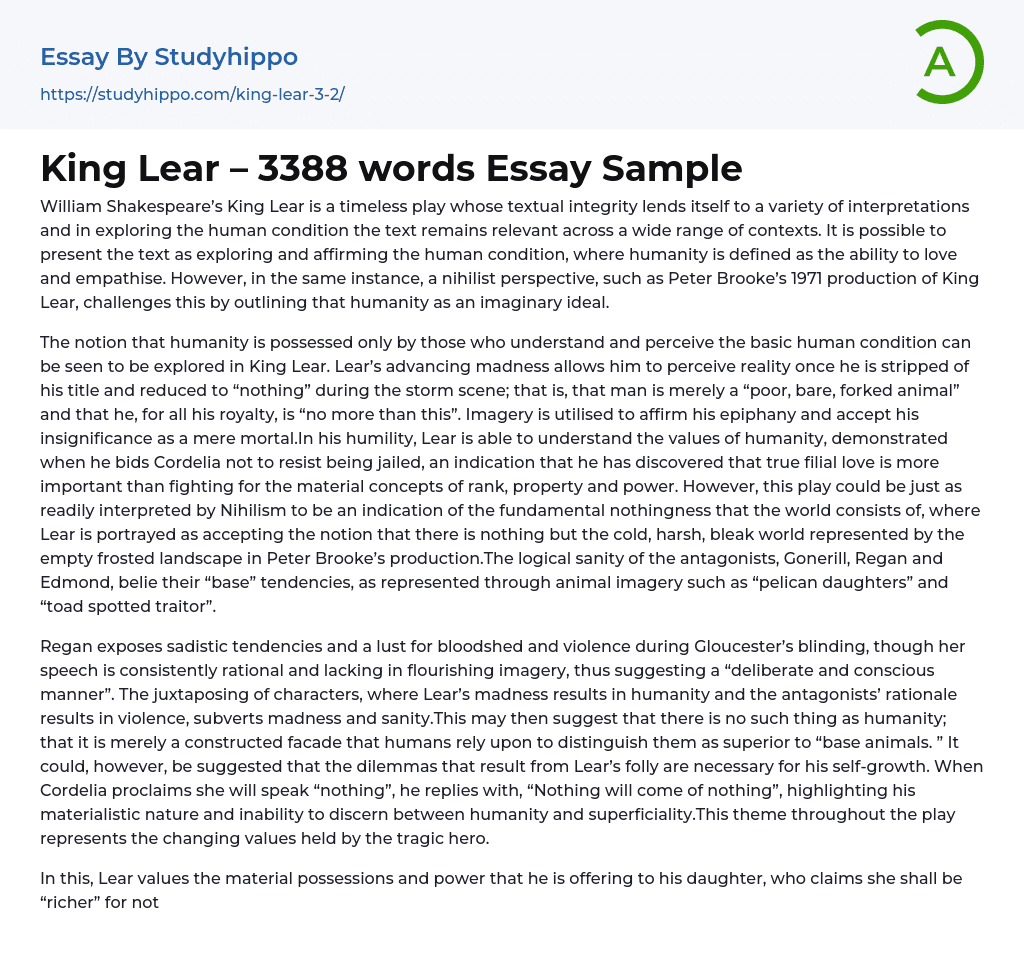William Shakespeare's King Lear is a play that can be interpreted in different ways, but its textual integrity makes it relevant to various contexts as it explores the human condition. One interpretation views the play as affirming humanity and exploring the ability to love and empathize. However, Peter Brooke's 1971 production of King Lear presents a nihilist perspective that human nature is an imaginary ideal.
King Lear explores the idea that understanding and perceiving the basic human condition is essential for possessing humanity. This is demonstrated through Lear's advancing madness, which allows him to see reality when he is stripped of his title and reduced to "nothing" during the storm scene. He realizes that humans are nothing more than "poor, bare, forked animals," and he accepts his insignificance as a mortal through imagery. Lear's realization allows him to understand the values of humanity,
...such as true filial love being more important than fighting for concepts like rank, property, and power. However, this play can also be interpreted by Nihilism as an indication of the fundamental nothingness of the world. Lear accepts that there is nothing but the cold, harsh, bleak world represented by the empty frosted landscape in Peter Brooke’s production. The antagonists like Gonerill, Regan, and Edmond are portrayed as having base tendencies despite their logical sanity. This is demonstrated through animal imagery such as "pelican daughters" and "toad spotted traitor."
During Gloucester’s blinding, Regan displays sadistic tendencies and a lust for bloodshed, but her speech remains rational and lacks flowery imagery, indicating a “deliberate and conscious manner”. This juxtaposition of characters challenges the traditional dichotomy of madness and sanity by depicting Lear’s madness as humane
and the antagonists’ rationale as violent. This subversion suggests that humanity may be a constructed facade, used to assert superiority over “base animals”. Alternatively, Lear’s foolishness may be essential for his personal growth, as Cordelia’s silence prompts his materialistic tendencies and inability to differentiate between superficiality and humanity. The theme of changing values in tragedy is prevalent throughout the play.
Lear values wealth and power offered to his daughter, who rejects them for fear of hypocrisy. Meanwhile, Cordelia regards such material possessions as meaningless, in contrast with her sisters who neglect their filial duties to attain societal status. Cordelia's stance allows Lear to acknowledge his human traits, showing that humanity prevails despite obstacles. However, some may argue that Lear's tragedy stems from his reliance on material goods, as evident in his preference for rewarding his children with wealth over anything else.
The significance of Lear's misguided value judgements is evident when Gonerill and Regan inquire about his train and he responds with the phrase, "Reason not the need!" This emphasizes the idea that Lear's possessions define him. In Brooke's adaptation, the camera spirals around Lear as he grapples with the betrayal of his daughters. However, during the storm scene, Lear lets go of his material possessions and exclaims, "Off, off, you lendings!" demonstrating his comprehension that possessions have no real value. This could potentially be interpreted as a nihilistic viewpoint, indicating that Lear has resigned himself to the notion that all things are essentially worthless. Deception is a recurring theme in the play, contributing to our understanding of the human condition.
Gloucester and Lear both display egocentric tendencies and are easily swayed by flattery. Dramatic irony is evident
as Gloucester loses his sight to gain insight into “how this world goes”, declaring, “I stumbled when I saw.” Similarly, Lear descends into madness after discovering his daughters’ deceitful love, ultimately finding humanity in his own derangement. It could be argued that it is their children’s treachery that triggers their self-awareness, revealing that, despite life’s obstacles, humanity can still prevail. Ultimately, as a tragedy convention dictates, peace must be restored.
The three characters are able to marry quickly after slaying the antagonists, but this action leads to further consequences, including Cordelia's death. Lear is deceived by his daughters, and as a result, Cordelia suffers for it. The play suggests that fate and divinity cannot be controlled, as seen in the death of an innocent. Kent questions if this is the promised end, indicating that there will always be cruelty in the world, making everything meaningless and representing a nihilistic perspective. King Lear explores human nature through his characters, depicting deceptive and animalistic behavior. This renders humanity futile, but characters like Edgar and Cordelia demonstrate the potential for humanity to persevere despite hardships.
It is clear that King Lear has textual integrity, meaning that all of its elements can be used to create a meaningful interpretation for any context.
- Age Of Enlightenment essays
- Ethos essays
- Time essays
- Acceptance essays
- Meaning Of Life essays
- Reality essays
- Natural Law essays
- Political Philosophy essays
- Utilitarianism essays
- Existence essays
- Free Will essays
- Good And Evil essays
- Confucianism essays
- Relativism essays
- Conscience essays
- Environmentalism essays
- Empiricism essays
- Epistemology essays
- Ethics essays
- Existentialism essays
- Human Nature essays
- Individualism essays
- Metaphysics essays
- Philosophy Of Life essays
- Transcendentalism essays
- Truth essays
- Destiny essays
- Determinism essays
- Fate essays
- Functionalism essays
- Philosophers essays
- Pragmatism essays
- Future essays
- Child Observation essays
- Critical Reflection essays
- Teaching Philosophy essays
- Personal Philosophy essays
- Action Speak Louder Than Words essays
- Can Money Buy Happiness essays
- Values of Life essays
- Ethical dilemma essays
- Normative Ethics essays
- Virtue Ethics essays
- Belief essays
- Deontology essays
- Moral essays
- Virtue essays
- Work Ethic essays
- Henry David Thoreau essays
- Carl Jung essays




